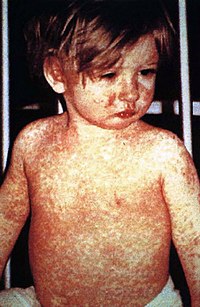
Photo from wikipedia
This study aimed to evaluate the disease severity and local immune responses in macrophage-depleted chicks with Eimeria tenella. Macrophages were reduced by intraperitoneal injection of a carrageenan solution at 12,… Click to show full abstract
This study aimed to evaluate the disease severity and local immune responses in macrophage-depleted chicks with Eimeria tenella. Macrophages were reduced by intraperitoneal injection of a carrageenan solution at 12, 13, and 16 days old, whereas the control group received intraperitoneal phosphate-buffered saline. Both chick groups were orally inoculated with E. tenella sporulated oocysts at 14 days old. Feces were collected daily, which were then quantified for oocysts. The chicks were sacrificed on day 5, and the ceca were collected for histopathological observation. The gene expression levels were measured using real-time quantitative reverse transcription-polymerase chain reaction. Macrophage-depleted chicks have been observed to shed a significantly reduced number of fecal oocysts compared to the infected control group. The parasite burden score in cecum specimens of macrophage-depleted chicks was significantly lower than those of infected control on day 5 after infection. Furthermore, macrophage reduction yielded significantly lower cecum histopathological scores and CD4 expression than those of the infected control group. The expression of interleukin (IL)-18, IL-22, interferon-γ, and inducible nitric oxide synthase was also noted to be significantly upregulated in both infected control and macrophage-depleted chicks compared to uninfected chicks. IL-4, IL-13, IL-17, and perforin expressions were also higher with macrophage depletion than in both control groups. These results suggest that macrophages serve as an invasive gate or a transporting vehicle to the site of first merogony. Furthermore, mononuclear phagocytes may play an important role in local immune responses, thus contributing to parasite development during early E. tenella infection.
Journal Title: Research in veterinary science
Year Published: 2021
Link to full text (if available)
Share on Social Media: Sign Up to like & get
recommendations!